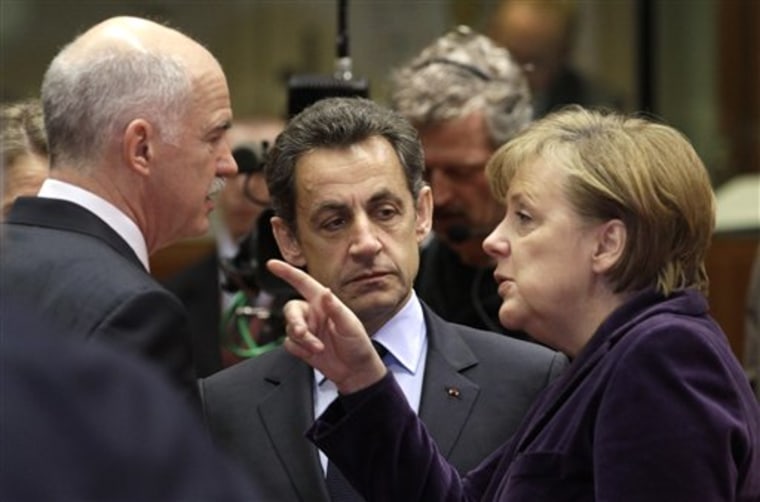European Union leaders urged dialogue and an end to violence in Egypt in a cautious joint statement at the conclusion of a one-day summit in Brussels on Friday, ignoring calls by Britain's prime minister to take a stronger stance against a teetering regime.
In Greece, Prime Minister George Papandreou said he would visit Egypt to deliver a message from the 27-nation bloc to embattled Egyptian President Hosni Mubarak. Papandreou said he expected the visit to take place Sunday. He refused to say what was contained in the message, saying it wouldn't be appropriate to reveal any details before meeting Mubarak.
British Prime Minister David Cameron warned that Egypt's leadership risks losing any remaining international credibility if it uses violence on protesters on Cairo. The EU has been criticized for lagging behind President Barack Obama in distancing itself from Mubarak, and Cameron appeared to challenge his fellow European leaders to follow suit.
EU leaders called on all parties to show "restraint" and said Egypt should start its transition process "now." The cautious statement reflected long-standing divisions in Europe over how to deal with the Middle East and autocrats in allied nations.
"I don't believe we should be dictating to other countries who should be running them," Cameron told reporters after the conference ended. But if Egyptian authorities continue to use repression against pro-democracy demonstrators, he said, "they'll lose any shred of credibility they might have."
Cameron and French President Nicolas Sarkozy warned that a protracted standoff could increase popular support for the Muslim Brotherhood and other religious groups.
"I don't believe the choice in Egypt should be between a government that (tramples) human rights, or an extremist Islamic regime," Cameron said.
'Transition process must start now'
But EU leaders at the summit shied away from echoing the Obama administration's calls for Mubarak to step down. Instead, the summit's final statement only called for the democratic aspirations of Egyptian citizens to be addressed through dialogue and political reform, underlying that "this transition process must start now."
A British official said that meant that Egypt should start putting constitutional changes and other steps in place to allow for democratic change. The official, speaking on condition of anonymity according to customary policy, said that Cameron pushed the other EU leaders for strong language in the EU-wide statement.
Italian Premier Silvio Berlusconi, meanwhile, defended Mubarak at the summit.
Berlusconi called for "continuity" and a transition in Egypt "without a break from a president like Mubarak, who in the West, above all in the U.S., was always considered the wisest of men and a precise reference point for the whole Middle East."
There was no mention of any punitive measures against Mubarak, such as the sanctions imposed against Belarus after President Alexander Lukashenko's crackdown against pro-democracy activists, or the freezing of assets of Tunisia's ousted president Zine El Abidine Ben Ali.
The summit also asked the EU's foreign policy chief, Catherine Ashton — who has been criticized for inaction on the issue — to travel to Cairo and convey the bloc's message. No date was set for the visit, although officials said it could come in the next several days.
EU, Cairo close
The EU has had a close relationship with Cairo as part of its partnership with other Mediterranean nations. Critics have said it has been too timid in supporting pro-democracy demonstrations and is trailing behind the U.S. in distancing itself from Mubarak's regime.
Mubarak, in power for nearly three decades, has been under heavy pressure from demonstrators to leave office, and everyday life in Cairo has been turned upside down by Egypt's largest anti-government protests in decades.
In Washington, U.S. officials said Thursday that talks were under way between the Obama administration and top Egyptian officials regarding Mubarak's possible immediate resignation. That would in theory be followed by the formation of a military-backed caretaker government that would prepare the country for free elections later this year.
But speaking to reporters before the EU summit, Dutch Prime Minister Mark Rutte said it would be "gratuitous and arrogant" for the bloc to follow U.S. moves.
"We have to be very practical about things," he said. "Look, Obama has influence with Mubarak; that is what (Obama) has to take care of."
Meanwhile, lawmakers in the European Parliament criticized the EU for choosing the "easy option" of simply condemning the violence and calling for restraint.
"They need to be much tougher and make it clear that Europe will not tolerate Mubarak clinging desperately to office," the German Socialist leader in the European Parliament, Martin Schulz, said.
"On foreign policy issues, the EU too often behaves like a frightened rabbit in the headlights of a car," he added. "The EU summit should use all its weight to ensure that today is Mubarak's day of departure."
Lawmakers from other parties also lambasted Ashton's foreign service for "playing second fiddle" to Washington, and warned against continuing the policy of supporting pro-Western dictators in the Middle East.
